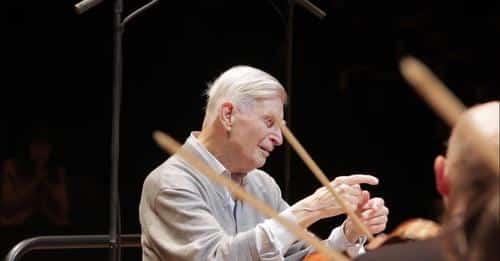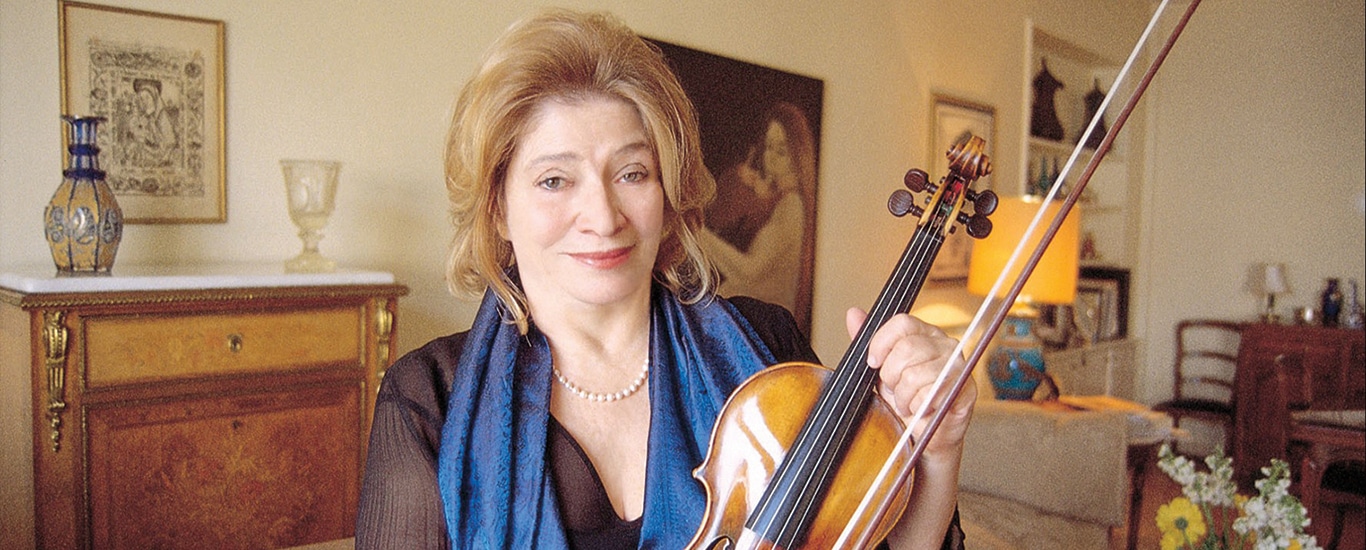| CHICAGO—The Chicago Symphony Orchestra Association (CSOA) released its fiscal year 2013 results at its Annual Meeting today at Symphony Center. The 2012/13 season marked the CSOA’s third consecutive year of record-breaking fundraising, with ticket sales at an all-time high, according to Jay Henderson, chairman, and Deborah F. Rutter, president of the CSOA, who also presented the artistic and financial highlights of the season.
“Under the leadership of Music Director Riccardo Muti, the Chicago Symphony Orchestra’s exceptional music making, artistic programming and community engagement initiatives continue to serve audiences of all ages and walks of life,” said Rutter. “This is what we are most proud of. While reaching audiences on tour and away from home is crucial to our global presence, it is serving this city that helps define our mission best—bettering the lives of our listeners through music. Our efforts to maintain stable operations while increasing earned and contributed revenue have helped us do just that.”
CSOA Chairman Jay Henderson noted, “The CSOA Board of Trustees is committed to maintaining the financial strength of this great institution, while preserving the CSO’s legacy of artistic excellence and supporting the vision of our music director, Riccardo Muti. We want to thank our music director, musicians, patrons, staff, donors and volunteers for their commitment to the CSO. It is through our combined efforts that we were able to achieve our excellent results this past year, and also provide a strong foundation for the future of the CSO. Thanks to the dedicated work of everyone in the CSO family and our engaging programming, we experienced record ticket sales and record fundraising results.”
Ticket Sales and Earned Revenue for Fiscal Year Ending June 30, 2013*
- Ticket sales totaled $22.3 million for 305 CSOA-presented events at Symphony Center, a 4.5% increase over last year’s record amount of $21.4 million.
- Single-ticket revenue from CSO subscription series was up 15.7% over last year, with concerts sold at 82% paid capacity.
- In addition to ticket revenue, other earned revenue of $9.9 million was taken in from tour fees, merchandise sales, space rentals, royalties, recording fees and miscellaneous activities.
- Nearly 381,000 tickets were sold for 235 ticketed concerts.
- Approximately 557,000 people attended CSOA performances and presentations at Symphony Center and in other venues around Chicago last season, including 173 free events such as Civic Orchestra of Chicago concerts, the CSO’s All-Access chamber music programs, education programs and open rehearsals for students and community groups, as well as the CSO’s free performance at Millennium Park.
- Of the organization’s total FY13 operating budget, 85% was spent directly on concerts, programs, and education and community engagement activities.
* Figures exclude concerts at Ravinia or on tour anywhere outside of the Chicago area.
Contributed Revenues for Fiscal Year Ending June 30, 2013
- The CSOA ended FY13 with a record level of fundraising for the third consecutive year, raising $29.8 million in annual support—a 6% increase above last year’s total of $28.2 million.
- Overall fundraising totaled $52 million for FY13, which includes operating support and gifts given directly to the endowment and special projects.
Financial Information for Fiscal Year Ending June 30, 2013
- Operating revenues totaled $73.6 million, a 2.6% increase over FY12’s $71.8 million.
- 44% of the Association’s operating revenue was from ticket sales and other earned revenue sources.
- Operating expenses totaled $73.8 million, resulting in an operating deficit of $169,000, or 0.2%.
Endowment
- Total assets increased by $37 million to $473 million, and net assets increased by $51 million to $266 million, due to an increase in contributions and investment returns.
- Endowment investments were $257 million.
- Under the oversight of the Investment Committee, the CSOA’s long-term endowment returns continue to rank among the highest of comparable funds with a 10-year return in the top 18%.
Artistic Highlights for fiscal year ending June 30, 2013
Noting the artistic highlights of the 2012/13 season, Rutter referenced the free season-opening community concert of Orff’s Carmina Burana in Millennium Park for an audience of 7,000—despite the pouring rain—led by Music Director Riccardo Muti. Maestro Muti went on to lead the CSO on tour to New York’s Carnegie Hall for its season-opening concerts, and to two cities in Mexico for CSO debuts: Guanajuato and Mexico City. His performances here at home garnered rave reviews and brought tens of thousands to Orchestra Hall, including 10,000 for the four performances of Bach’s B-Minor Mass alone. Guest conductors Lorin Maazel, Osmo Vänskä and Edo de Waart graciously stepped in for Maestro Muti in January and February for subscription concerts and on tour to Asia, which included CSO debuts in several important cities there: Taipei, Taiwan; Tianjin, China; and Seoul, South Korea.
The Citizen Musician Initiative expanded its scope here in Chicago and beyond during the 2012/13 season. CSO musicians performed free events here at home and on tour in New York, Mexico, Taiwan and China, including master classes, free recitals, and performances at churches and hospitals. Programming for youth who are incarcerated continued at the Illinois Youth Center in Warrenville and was also expanded to the Cook County Juvenile Temporary Detention Center. The Civic Orchestra of Chicago undertook an artistic challenge from Yo-Yo Ma and worked tirelessly to perform a major symphony without a conductor at the end of the season.
Ending the season, the Rivers Festival, inspired by Judson and Joyce Green Creative Consultant Yo-Yo Ma and Music Director Riccardo Muti, was a huge success. Over the course of a month and across Chicago, the festival included dozens of concerts, symposia, school events and other activities—including a community performance at Chinatown’s Ping Tom Memorial Park with Maestro Muti leading the Chicago Children’s Choir in Verdi’s “Va, pensiero.”
In a continuing effort to reach new audiences, the CSO performed for the first time at The Morton Arboretum in DuPage County in June. The five concerts of varied repertoire led by guest conductors Richard Kaufman and Carlos Miguel Prieto were a rousing success, bringing almost 11,000 new fans to hear our Orchestra. The CSO also presented its unique concert programming for the very young—Once Upon a Symphony—with two sold-out performances of Goldilocks and the Three Bears. This remarkable response indicates that there is indeed an audience to be served by the CSO in this community, and the Orchestra looks forward to returning to test our plans for sustaining a presence in the western suburbs.
CSO Trustees, Governing Members and Officers Elected
Seven new Chicago Symphony Orchestra Association trustees were elected to three-year terms: Randy Berlin, University of Chicago School of Law; Raj Fernando, CEO, Chopper Trading LLC; Rick Fezell, Vice Chairman and Managing Partner of the Midwest Region, Ernst & Young LLP; Christopher Melvin, Chairman and CEO, Melvin & Company; E. Scott Santi, President and CEO, Illinois Tool Works, Inc.; Walter Snodell, Chairman and CEO, Peerless Industries Inc.; and Robert A. Wislow, Chairman and CEO, U.S. Equities Realty.
Four new CSOA life trustees were also elected: Richard Colburn, Henley Management Company; Joseph Glossberg, Gofen and Glossberg LLC; Mary Winton Green, David Green and Mary Winton Green Foundation; and Jerry Rose, Retired Vice Chairman, Jones Lang LaSalle. In addition, 14 trustees were re-elected to additional three-year terms, and 61 men and women were made new Governing Members.
Finally, the following individuals were elected as officers of the CSOA: Jay Henderson, Chairman; Frank M. Clark, Joyce T. Green, Jane DiRenzo Pigott, Frederick H. Waddell, and Paul Wiggin, Vice Chairs; Deborah F. Rutter, President; and Scott C. Smith, Treasurer.
A moment of silence was given for those trustees who passed away during the 2012/13 season: Virginia Rogers and David Speer. |






One criticism: more recordings of the CSO conducted by Muti should be issued.
This is ironic in view of Muti’s repeated health problems, which have caused him to cancel a lot of appearances.
Of course they’re making more money. The smart ones from Minnesota are attending and contributing. They are sounding fantastic these days.
My wife and I were in Chicago and heard two exceptional and outsanding programs. Muti and the Chicago Symphony performed a fantastic Macbeth. Verdi never heard such his genius radiated to this degree. The soloists were first class in every respect as was the chorus (which has gorgeous quality).
Muti and the supurb Chicago Symphony brought enormous life to this drama. I found out from close friends both in and outside of this great orchestra that Muti is loves by the musicians, by the audiences, by the critics and by the city of Chicago.
He returns that love.
The other concert we attended featured the concertmaster, Robert Chen. Hindemith’s Violin Concerto was rendered brilliantly by Chen. Bravo Bravo.
Larry Grika: Member of the Philadelpia Orchestra: 1964-2005.
Yes, I missed Maestro Muti when he decided to return to Italy. Too bad for Philadelpha. But now it most fortunate for you: the city of Chicago and the wonderful musicians of the Chicago Symphony, that you have this great conductor and mensh Riccardo Muti.
Meanwhile, poor old Boulez has had to cancel yet again through ill health.
This week, Milan
To my knowledge Boulez hasn’t conducted since he started a string of cancellations early in 2012. First Cleveland, then CSO, later that year London, Vienna. I saw him in Cleveland and he was in no condition to work with the orchestra. Very frail, almost blind, and I am afraid not fully aware of his condition himself. I think it is totally irresponsible that orchestras book him still and keep advertising his concerts. Of course, it would be a “sensation” were he to step on the podium once again, but that is very cynical and calculating box-office thinking in my opinion. He should retire gracefully and not make a fool of himself.
There’s probably truth in that. The lockout of the Minnesota Orchestra–which was sounding incredibly fine beforehand–by its benighted management (Henson, Davis, Campbell, et al) has left a big hole in classical music in the upper midwest. It wouldn’t surprise me at all if those who can afford it are flying to Chicago for concerts there; now that the MO is in limbo, Chicago is the closest world-class orchestra.
Ironic? How, ironic? Rather, I think ticket buyers keeping faith through Muti’s health blips demonstrates a level of audience excitement that transcends such inconveniences to them. I remember his last concert– a benefit– in Philadelphia. The excitement level was at fever pitch. We were all on our feet cheering when Muti came onstage. When the trumpets came in with the theme in the “William Tell,” the audience burst into spontaneous applause. We came to hear epic music making, and we got what we came for. How Philadelphia let him go is beyond belief. It’s almost as if they WANTED financial disaster. VIVA MUTI! Chicago, I am SO jellus.
Muti left Philadelphia in 1992. You should know that since you say you were there at his last concert. Do you really think the orchestra has financial problems now because Muti left 20 years ago?